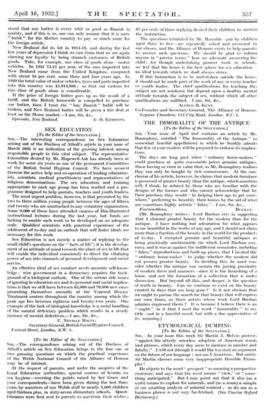SEX EDUCATION
[To the Editor of the SPECTATOR.]
Sta,—The interesting correspondence on Sex Education arising out of the Duchess of Atholl's article in your issue of March 26th is an indication of the growing interest among responsible people in this vital subject. The representative Committee desired by Mr. Hopewell-Ash has already been at work for some six years as one of the permanent Committees of the British Social Hygiene Council. We have secured thereon the active help and co-operation of leading education- ists, scientists, medical practitioners and representatives of religious denominations. The sex education and training appropriate to each age group has been studied and a pro- gramme designed to help parents, teachers and youth leaders.
The most urgent problem, however, is that presented by the two to three million young people between the ages of fifteen and twenty who are unattached to any voluntary organisation. Some 9,000 of these have attended courses of film-illustrated instructional lectures during the last year, but 'funds are lacking to enable such work to be developed on an adequate scale. Qualified scientists with practical experience of the adolescent of to-day and an outlook that will foster ideals are necessary for this work.
Sex Education is not merely a matter of replying to the small child's questions on the "facts of life"; it is the develop- ment of an attitude of mind towards the place of sex in life that will enable the individual consciously to direct the vitalizing power of sex into channels of personal development and racial service.
An effective ideal of sex conduct needs accurate self-know- ledge ; wise government in a democracy requires the back- ground of a biological outlook. One of the serious side issues of ignoring in education sex and its personal and social implica- tions is that we still have between 65,000 and 70,000 new cases presenting themselves annually at the Venereal Disease Treatment centres throughout the country among which the peak age lies between eighteen and twenty-two years. One example of the lack of biological knowledge is a social handling of the mental deficiency problem which results in a steady increase of mental defectives.—I am, Sir, &e.,
C. NEVILLE ROLFE,
Secretary-General, British Social Hygiene Council. Carterd Street, London, 8.11' .1.








































 Previous page
Previous page